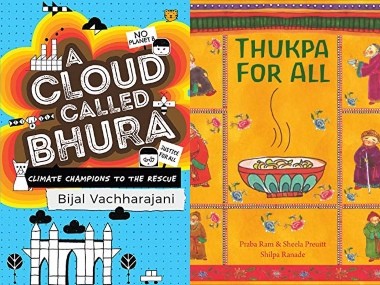The month of March is usually accompanied by a whiff of hope for the young and old alike – of spring, annual vacations, the end of exams and the start of summer holidays. Not this year, though. Right now, the streets are the emptiest they have been in a long time, while homes are the most cluttered they can be. In the times of COVID-19 and social distancing, children and adults are spending (forced) time together under the same roof. The initial euphoria of cancelled exams and unexpected holidays has now worn off. The understanding that they are well and truly stuck at home has sunk in for many children, though they may not fully understand what the panic is about. As children begin to get bored and harried parents run out of ways to engage and entertain them, the children’s literature community has come to the rescue. An interesting phenomenon is playing out on Reading Raccoons, a Facebook group for book lovers whose children also enjoy reading. “The kidlit community is a small, tight-knit group in India. We saw what Oliver Jeffers was doing with Instagram Lives and within ten minutes, we had a plan,” says Bijal Vachharajani, award-winning author of A Cloud Called Bhura. Vachharajani is part of a group of Indian writers and illustrators who came up with a plan to have a different author read out a story at 11 am everyday. Roopal Kewalya, author of The Little Rainmaker, created the hashtag #ThodaReadingCORONA, and soon enough, dozens of authors were on board. “It’s hard, for both parents and children alike, to be shut down in the house with no end in sight,” Vachharajani adds, “We thought if we could bring in some sort of routine and conversation into these homes, it would be great.” Pavithra Radhakrishnan, a software professional and mother of two, agrees. “I cast the readings up on TV and let them watch. Ideally, I would frown at any extra screen time, but right now, I will take every 15-minute break I can get. This is perhaps one of the better ways to use the screen.” Illustrators and publishers, however, want to capture children’s imaginations for more than 15-minute intervals. Many Indian picture books are creative ways to start meaningful conversations with kids, and these readings were started with the same objective. For instance, Neha Bahaguna, who writes children’s shows, read out a story set in Sikkim. She used the setting as a segue into explaining why it is not acceptable to call people ‘coronavirus’ (the word has become a slur used against those from Asia). Tanu Shree Singh, founder of the Reading Raccoons and a professor of Psychology, says that including this element was always part of the plan. Her recent picture book, Darkless, deals with loss, and her read-aloud session consisted of small but powerful exercises aimed at helping children to handle anxiety. “We need to learn the facts first, and then give them to the kids in a very logical manner. Also, talk them through coping,” she says, on the subject of how crucial it is to have difficult conversations with children. “It is important for them to feel some agency, like they are in control,” says Vachharajani.
A group of writers and illustrators from the children’s literature community came up with a plan to have a different author read out a story at 11 am everyday. One writer read out a story set in Sikkim; she used the setting as a segue into explaining why it is not acceptable to call people ‘coronavirus’ (the word has become a slur used against those from Asia)
Advertisement
End of Article


)
)
)
)
)
)
)
)
)



